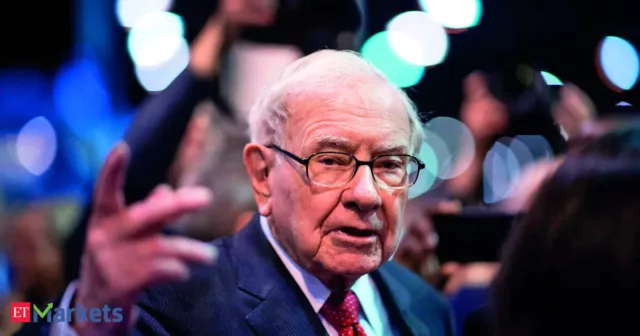
Warren Buffett’s long-standing investment in China’s BYD is emerging as one of his most consequential moves in the electric vehicle (EV) space, not only for its returns but also for what it says about the kind of electric future the billionaire believes in.
As Tesla’s stock slides and sales weaken under intense global competition and political headwinds, Buffett’s deliberate avoidance of Elon Musk’s high-profile EV giant, despite multiple public nudges from Musk himself, is telling.
Buffett, known for his disciplined, value-based investing style, stunned markets back in 2008 when Berkshire Hathaway acquired a 9.9% stake in BYD for about $230 million. More than 15 years later, that stake has ballooned in value to between $6 billion and $8 billion, even after Berkshire trimmed its holdings to under 5% in 2024. The gradual reduction, seen by some as profit-booking rather than a loss of confidence, hasn’t changed the core message: Buffett got it right, early.
BYD surges ahead as Tesla stumbles
In March 2025, BYD overtook Tesla in quarterly automotive revenue for the first time, a milestone that marks more than symbolic victory. It underscores a fundamental shift in global EV dynamics. BYD sold around 1.76 million battery-electric vehicles in 2024, just shy of Tesla’s 1.79 million. But when plug-in hybrids are included, BYD’s total New Energy Vehicle (NEV) sales soared to 4.27 million units, far eclipsing its American rival.In Europe, BYD outsold Tesla in battery EVs for the first time in April 2025, registering 7,231 units to Tesla’s 7,165, according to data from JATO Dynamics. The company’s appeal lies in practical design, lower costs, and its proprietary Blade Battery technology, which allows BYD to maintain margin flexibility amid a brutal price war.
Tesla, on the other hand, is feeling the heat. The company saw its first drop in annual deliveries last year and reported a 13% decline in Q1 2025. Analysts expect another year of contraction, citing factory halts, delayed model rollouts, and intensifying competition from Chinese rivals like BYD. In the first half of 2025, Tesla shares have fallen 21%, while Shanghai-listed BYD stock is up 22.4%.
The price war that changed everything
The global EV price war that began in early 2023, sparked by Tesla’s initial price cuts, has become an all-out brawl. Chinese automakers, particularly BYD, responded aggressively, undercutting global rivals.
As prices dropped, automakers saw profit margins shrink. BYD’s ability to produce its own batteries and leverage vertical integration proved critical in maintaining profitability, even as entry-level models like the Seagull and Dolphin pushed EV prices below $30,000.
In contrast, Tesla’s margins have come under severe pressure, particularly in Europe and China. Market participants say buyers have also been put off by Elon Musk’s growing political involvement and polarizing public persona, which has triggered protests and boycotts in the U.S. and abroad.
Why Buffett said no to Tesla
Buffett has long held that the auto industry is too capital-intensive and cyclical for consistent investment returns. At Berkshire’s 2024 annual meeting, he reiterated that his late partner Charlie Munger had pushed strongly for the BYD investment. “Charlie twice pounded the table … and said, ‘Buy BYD.’ He was right — big time,” Buffett said.
While Musk has publicly suggested Buffett should invest in Tesla, the Oracle of Omaha has shown little interest. Tesla doesn’t match Buffett’s investment criteria: stable leadership, durable competitive advantages, and predictable returns on invested capital.
Buffett has also consistently avoided U.S.-based EV startups like Lucid and Rivian, citing high burn rates and unproven scalability. BYD, by contrast, combines mass manufacturing, a cost advantage, and global reach, all underlined by disciplined expansion and consistent product evolution.
Global shift, strategic patience
While Tesla has concentrated on markets in North America and Europe, BYD is moving swiftly into Latin America, Southeast Asia, and even Europe, often via local partnerships and manufacturing. This approach helps it bypass tariffs and offer localized, price-sensitive EV models, a strategy well-suited to emerging markets.
Despite phasing out subsidies in regions like China and changing tax credit rules in the U.S., BYD’s pricing edge remains intact. It continues to gain share in cost-sensitive segments where Tesla’s premium brand and higher prices are harder to justify.
Buffett’s investment in BYD also complements his broader bet on the green energy transition. Through Berkshire Hathaway Energy, the billionaire has backed solar, wind, and grid infrastructure, reinforcing his support for a low-carbon economy from multiple angles.
Buffett once said, “We only swing at pitches we like.” His early swing on BYD, and his steadfast refusal to follow the hype around Tesla, is a textbook display of his principles in action. It’s not that he missed Tesla, it’s that he made a different, arguably smarter, play.
As EVs redefine the global auto industry, Warren Buffett’s legacy now includes helping shape its direction. In a sector full of hype, his investment in BYD remains a model of clarity, conviction, and long-term thinking.
Also read | Warren Buffett’s AI legacy: Apple and Amazon now make up a fifth of Berkshire’s $282 billion portfolio
(Disclaimer: Recommendations, suggestions, views and opinions given by the experts are their own. These do not represent the views of the Economic Times)









